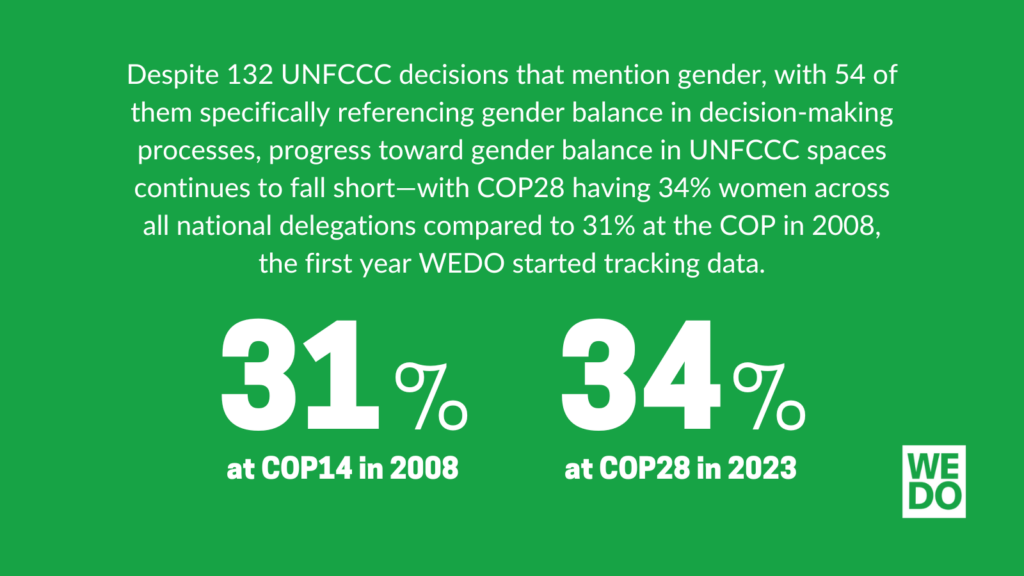FOR IMMEDIATE RELEASE
24 January 2024
Contact: Lindsay Bigda | lindsay@wedo.org
Parties are bringing thousands more delegates to participate in the annual climate negotiations – but they are not bringing more women
New Data Shows 34% Women’s Participation on Party Delegations at COP28, the same percentage as 10 years ago
New analysis from the Women’s Environment and Development Organization (WEDO)–which has collected sex-disaggregated data on Party delegations to the UNFCCC negotiations for the past 15 years, accessible on the Gender Climate Tracker app and website–shows that 34% of Party delegates at COP28 were women, and less than one in five Heads of Delegation (19%) was a woman.
“Participation in climate and environmental decision-making is a human right, and equal participation of people of all genders generates outcomes that are more effective and sustainable,” said Tara Daniel, WEDO Senior Program Manager who analyzed the latest dataset. “Yet despite this evidence, women are consistently underrepresented in decision-making spaces–especially those that wield the most power. Only 2% of delegations had equal numbers of men and women, while 79% of delegations had more men than women.”
Delegations are consistently growing, and COP28 saw a record-breaking 20,188 unique Party delegates according to the UNFCCC’s Final List of Participants. For comparison, there were 11,955 Party delegates at COP27, and 9,731 at COP26. However, this increase in delegation size has not been accompanied by increased prioritization of gender balance. The 34% rate of women’s participation at COP28 marks a 1 percentage point decrease from last year’s COP27, and only a 3 percentage point increase from COP14 in 2008, the first year WEDO collected the data. Given the recent stagnation and even decrease in women’s participation, gender parity is unlikely to be reached until at least 2043.
“Ensuring women’s full participation at all levels of climate politics is imperative in the fight for climate action,” said Mary Robinson, Chair of The Elders. “We simply cannot advance if half of the world’s population is not represented. Gender diversity, racial diversity, and a diversity of ages are all prerequisites for true climate justice, and urgent, sustained action is needed to advance this agenda – at all international negotiations.”
Exclusion of critical voices
The lack of women’s participation on Party delegations is part of an overall trend of exclusion of critical voices. At COP28, the lead negotiator for small island nations denounced their exclusion from spaces where critical decisions were made. Civil society representatives–including those representing Indigenous Peoples and frontline communities closest to climate impacts–also faced significant barriers to accessing negotiation spaces, as well as having their lived experiences considered in the outcomes.
“If the people who are most affected by the climate crisis are not able to have a proper voice in the COP negotiations, how can the process be truly ‘inclusive’?” said Hamira Kobusingye, a youth climate activist from Uganda. “We’re proud that the youth movement in many countries is led by young women, but this has not yet translated into change at the level of COP. Climate impacts make existing gender inequalities worse, so a fair representation of women at the negotiation table is the bare minimum – nothing about us should be decided without us.”
Representation alone is not equality
Despite the all-time high women’s participation rate at the June 2023 Bonn Climate Conference (SB58), at 48%, the new COP analysis shows a business-as-usual scenario at the largest climate conference of the year. Intersessional negotiations, although crucial, have less decision-making power than COP meetings – which means that the spaces where women’s participation is progressing hold less power for shaping climate policy.
“It is also important to acknowledge that achieving 50% from the current 34% is not the only goal – as it would not necessarily equate to meaningful or equitable participation for women and gender-diverse people,” said Daniel.
Data is lacking on the representation of gender-diverse people, with only a handful of participants able to identify as non-binary within the UNFCCC’s registration system in recent years. Additionally, when breaking down this overall percentage by geographical area, existing inequities regarding resources, regional power differentials, and historical women’s participation may contribute to some striking distinctions. Africa and Asia tend to have lower women’s participation (with 31% and 28% respectively for COP28), while Europe and Others, Latin America and the Caribbean, and Oceania tend to have higher participation rates (with 42%, 43% and 46% respectively for COP28).
Representation on delegations and participation in the process are also not synonymous. Analysis of speaking times undertaken by the UNFCCC secretariat in 2022 shows that, during negotiations, women are less likely to speak than men.
Furthermore, studies of sex-disaggregated speaking times and frequency show significant gendered differences between thematic areas of the negotiations typically associated traditional gender roles – for example, men are more likely to speak in meetings on finance and technology, with women more likely to speak in meetings related to gender and education and empowerment.
“Ensuring women’s representation and leadership is not the same as considering gender as part of policymaking,” concluded Daniel. “The gender dimensions of climate change can and should be considered in all areas of the negotiations, guided by the work of gender experts – and not only by women.”



